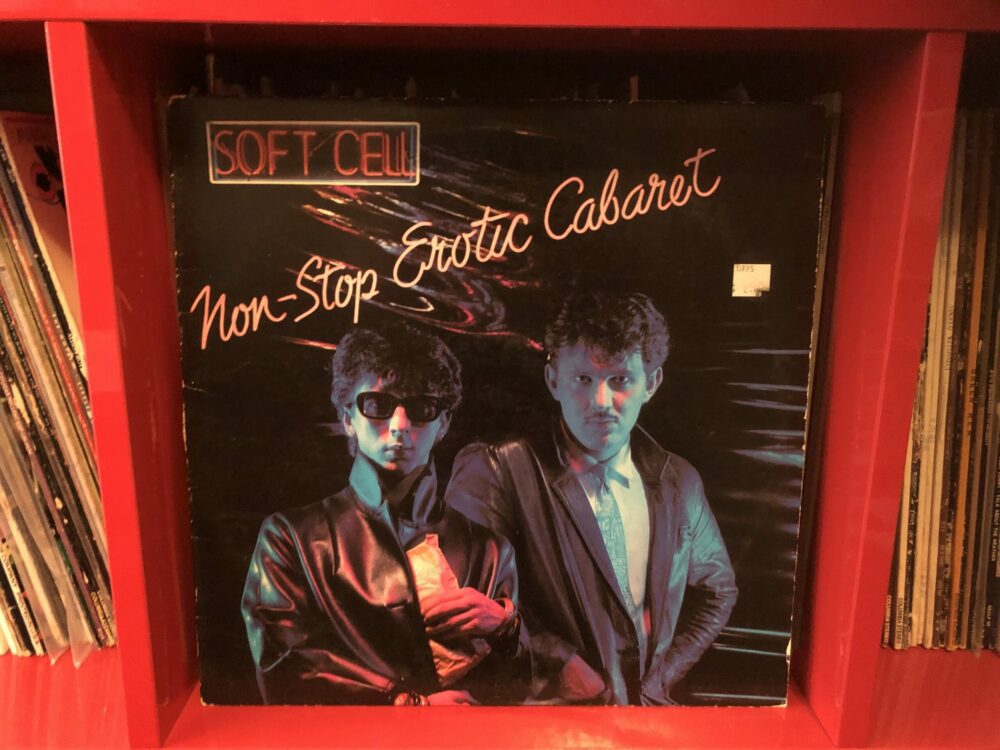

Recently, I was inside a downtown Los Angeles restaurant, staring at the food photos while waiting for my own order when “Tainted Love” came on the radio. Within the first few immediately recognizable bars of the song, the employee behind the counter— someone who appeared to be much younger than Soft Cell’s 1981 single— looked up and related a personal anecdote about the song. We laughed, sharing a quick moment of bonding between strangers over a song that seems to be a perennial part of the sound of this city.
About a week later, as I was writing this essay, I took a break and headed to a friend’s indie dance party. When he dropped “Tainted Love” sometime in the middle of the night, I noticed the crowd on an already busy dance floor fill up more. I don’t know how it is anywhere else in the world, but here in L.A., “Tainted Love” is that rare jam whose popularity has persisted for decades, as much a conversation-starter and dance floor filler now as the contemporary pop hits of any given era since the 1980s.
But, this essay isn’t about “Tainted Love.”
Just a few months after Soft Cell unleashed what would become their biggest hit, the duo formed by Marc Almond and Dave Ball dropped their debut full-length Non-Stop Erotic Cabaret. Released on November 27, 1981, the album was, and still is, a perfect mix of contradictions. It’s punk rock raw and disco slick. It was driven by new and innovative instruments, but the album’s backbone is its reliance on classic pop song structures. It’s incredibly accessible and also really fucking weird.
Even “Tainted Love,” the song that everyone and their grandma knows, was unusual for its time. For those of us who grew up with the song in the ether, it can be hard to recognize that. The song was originally recorded by Gloria Jones in the mid-1960s and became a cult hit years later when DJs in the U.K. northern soul party scene picked up on it. Meanwhile, electronic music was still novel in the early 1980s. In fusing the sound of the future with a song from the past, Soft Cell helped forge the foundation of synthpop.
Growing up in Los Angeles, Soft Cell was part of the steady stream of music floating through the airwaves of my own youth. KROQ, the alternative radio station that set so much of the city’s collective musical taste in the ‘80s and ‘90s, clung to “Tainted Love” years after its release. “Sex Dwarf” was also a big hit on the radio station; I probably knew all the lyrics (and sound effects) in that song before I could fathom what they meant. Yet, it wasn’t until high school – in the midst of the grunge era – that, for reasons I can no longer recall, I picked up a Soft Cell and Marc Almond compilation on CD, which led me to Non-Stop Erotic Cabaret.
I kept listening, over and over again, until I knew every line and memorized every electronic sound on that album. The purr of a synth that creates a seamless segue between “Youth” and “Sex Dwarf” makes me want to run to a dance floor every time I hear it. The subtle shift in the beat between “Entertain Me” and “Chips on My Shoulder” has kept me dancing at home without so much as a pause to catch my breath so many times.
I still remember how enthralled I was with Non-Stop Erotic Cabaret on first listen. It was like marathoning a TV series. Non-Stop Erotic Cabaret is a dance album, but the beats essentially pump up a series of narrative-centric songs (on a recent installment of Tim’s Twitter Listening Party, Soft Cell shared the backstory behind some of the songs on the album).
It opens with a stuttered cry of “frustration!” that heads toward a bouncy beat backing up Almond’s declarations of the world’s most ordinary man. (“I was born/One day I’ll die/There was something in between/I don’t know what or why.”) “Frustration” made a character so normal so intriguing. That sucked me into the album and the stories that followed kept me listening.
“Seedy Films” painted a picture of an encounter inside an adult theater vivid enough for my teen brain to fill in the blanks and giggle. “Bedsitter,” broke my heart, thinking about someone hiding their loneliness in public, even though I thought “bedsit land,” meant, literally, staying in bed. “Say Hello, Wave Goodbye,” the album’s closer, plays out like a particularly vicious breakup scene in a movie.
Even today, after years of regularly listening to what is one of my favorite albums of all time, I still have difficulty focusing on anything but Non-Stop Erotic Cabaret when it’s playing. Between its lyrical strength and off-the-wall production style that still feels forward-minded four decades on, the album is endlessly captivating. It’s an essential album for anyone remotely interested in electronic music and one that still has a lot to teach listeners.



